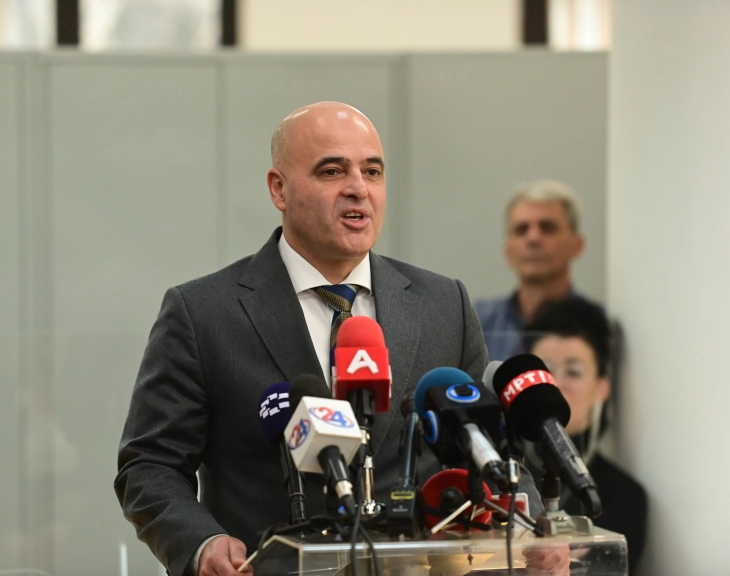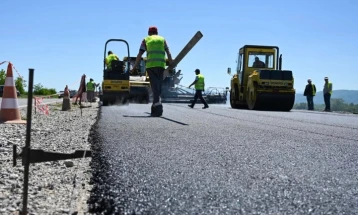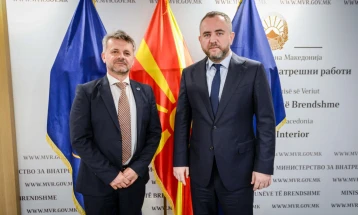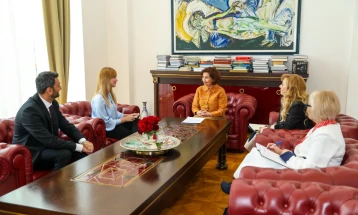Kovachevski: Clear negotiating framework, no additional conditions besides constitutional changes
- We have a clear negotiating framework, and there haven't been any new conditions in addition to the constitutional changes, Prime Minister Dimitar Kovachevski said Tuesday, commenting on the statement by Bulgarian Deputy Prime Minister and Foreign Minister Mariya Gabriel that the requirements for the progress on Skopje's European path encompass not only adoption of constitutional amendments, but also compliance with the Treaty of Friendship, Good Neighbourliness and Cooperation, and the two protocols, signed with Bulgaria.

Skopje, 19 December 2023 (MIA) - We have a clear negotiating framework, and there haven't been any new conditions in addition to the constitutional changes, Prime Minister Dimitar Kovachevski said Tuesday, commenting on the statement by Bulgarian Deputy Prime Minister and Foreign Minister Mariya Gabriel that the requirements for the progress on Skopje's European path encompass not only adoption of constitutional amendments, but also compliance with the Treaty of Friendship, Good Neighbourliness and Cooperation, and the two protocols, signed with Bulgaria.
“She didn't say that there are new conditions. We have a very clear negotiating framework. That framework, which includes commitments for both the European Union and North Macedonia. In Brussels, during the recent EU-Western Balkans Summit and at the latest European Council, we received the clearest conclusion since obtaining EU candidate status. In the paragraph, it was stated that the Republic of North Macedonia successfully concluded the screening process," Kovachevski replied to a journalist's question.
He emphasized that it remains for the country to fulfill its obligation to adopt the constitutional amendments, and the second intergovernmental conference should be scheduled immediately without delay.
"Thanks to the political parties that, for nearly two decades, blocked the country's entry into NATO and hindered the start of EU accession negotiations, and did not endorse the decision for the state's European integration, we found ourselves with an empty goal, a missed penalty, and as a result, the Republic of North Macedonia did not take any shots, in football terminology. North Macedonia has never had such a clear paragraph regarding EU conclusions before," he noted.
As for the other relations we have with the Republic of Bulgaria, he said that they relate to the Good Neighborliness Treaty and are addressed at the bilateral level, supported by intergovernmental and expert commissions.
"Nevertheless, the negotiating framework relates to the chapters; we have concluded the screening process exceptionally successfully, and negotiations are underway for those specific chapters. The conclusions clearly state what Macedonia needs to do so that the second intergovernmental conference can be convened immediately, without any delay or additional scheduling. Everything else is everyday politics that serves no one's interests except those who do not want to witness the country's integration into the European Union,” Kovachevski said at the event awarding birth certificates to previously undocumented persons.
Bulgarian Deputy Prime Minister and Foreign Minister Mariya Gabriel said Monday that Bulgaria has no bilateral problem with the Republic of North Macedonia regarding EU integration and that the requirements for the progress on Skopje's European path encompass not only adoption of constitutional amendments, but also compliance with the Treaty of Friendship, Good Neighbourliness and Cooperation, and the two protocols, signed with Bulgaria.
“Bulgaria has no bilateral problem with the Republic of North Macedonia. In the name of the common European interest, Bulgaria tells North Macedonia what it means to be a member of the European Union. We have three interconnected instruments and a very clear position from the National Assembly. Requirements of our neighbouring country encompass not only adoption of constitutional amendments, but also compliance with the Treaty of Friendship, Good Neighbourliness and Cooperation, and the two protocols, signed with Bulgaria,” she said at the Parliamentary committee on foreign policy when asked about North Macedonia’s path towards the European Union, BTA reported.
According to Gabriel, it is important for Bulgaria to see North Macedonia's progress in other areas if it experiences difficulties in the adoption of constitutional changes. Gabriel underscored that two technical meetings had been held in July in Sofia and in October in Skopje, from which it transpired that, regrettably, there was no progress.







